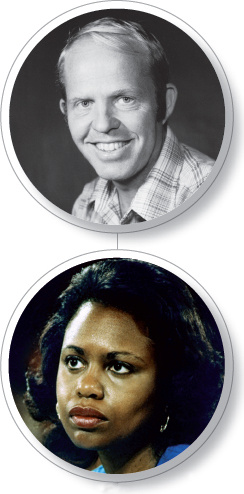American Histories: Allan Bakke and Anita Hill
AMERICAN HISTORIES

Allan Bakke was not a political ideologue or an activist. He had always played by the rules. Born in Minnesota in 1940, Bakke grew up in a white middle-class family, earned a degree in mechanical engineering, and served in Vietnam. When his tour of duty was over, Bakke returned home, found an engineering job in Sunnyvale, California, and received a master’s degree from Stanford University. However, he had not satisfied his great ambition—to become a physician.
In 1972 Bakke applied to two California medical schools and was turned down, probably because at age thirty-two he was considered too old. The next year, he applied to twelve schools but was rejected by all of them, including the University of California at Davis. Bakke learned that of the one hundred available spaces in the incoming class, the university awarded sixteen spots to minority group members, consisting mainly of African Americans, Chicanos, and Asian Americans. Contending that the policy amounted to reverse discrimination, he sued the University of California at Davis for violating his constitutional rights. In his challenge to the university’s admission policy, Bakke complained: “I realize that the rationale for these quotas is that they attempt to atone for past racial discrimination, but insisting on a new racial bias in favor of minorities is not a just situation.” In 1978 the U.S. Supreme Court ruled in his favor, and Bakke successfully completed his studies and graduated with a medical degree.
Like Allan Bakke, Anita Faye Hill did not seek celebrity, yet like Bakke she, too, would gain notoriety in a cause not of her own making. Born in Oklahoma in 1956, Hill grew up in a large family whose ancestors included Creek Indians and former slaves. Like other African Americans in the state, she encountered racial segregation when she attended school, but her parents encouraged her to work hard and abide by strong religious and moral values.
A bookish and determined young woman, Hill graduated from Yale Law School in 1980. The following year, she went to work in the Office of Civil Rights at the Department of Education. Her boss, Clarence Thomas, was an African American supporter of President Ronald Reagan. When Thomas moved to the Equal Employment Opportunity Commission in May 1982, Hill transferred as well. Although a pragmatic moderate who privately favored affirmative action, she tried not to make waves and defended the positions that the conservative Thomas implemented to further reduce the scope of affirmative action in the aftermath of the Bakke case.
Anita Hill would have remained an obscure public servant had President George H. W. Bush not nominated Thomas to the Supreme Court in 1991. During the course of Thomas’s Senate confirmation hearing, Hill testified before the Senate Judiciary Committee and a nationally televised audience that Thomas had made unwanted sexual advances to her on and off the job. Disturbed by Thomas’s harassment and sexual impropriety, Hill had quit her job in 1983 and returned to Oklahoma to teach at a law school. It was difficult for this usually shy black woman to publicly describe these embarrassing moments concerning a high-ranking black man, but her courage was not rewarded. Black and white conservatives defended Thomas and attacked Hill’s credibility, and Thomas won confirmation by a 52–48 vote. Nevertheless, she became a hero for many working women who faced similar incidents of sexual bias and harassment. •
ALLAN BAKKE and Anita Hill were not engaged in politics in the usual sense of the word. Nonetheless, their American histories took on profound political importance in the larger context of the rise and ascendancy of conservatism in the late twentieth century. Scoring their first national victory with the election of Richard Nixon in 1968, conservatives became the dominant force on the political landscape with the election of Ronald Reagan in 1980. Reagan led a New Right coalition that meshed the traditional economic conservatism of lower taxes, deregulation, and anti-unionism with the concerns of religious conservatives over abortion and family values. By 1992 conservatives had built upon the judicial victory of Allan Bakke and brushed back the complaint of Anita Hill in reshaping the nation’s political priorities. Still, they had neither silenced their progressive critics nor eliminated the impact of liberal achievements from the 1960s.